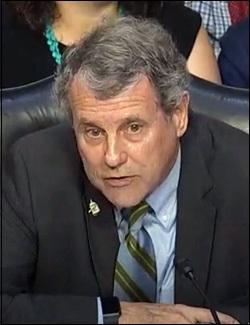Senator Compares Facebook’s Libra Association to Spectre in James Bond Movie
by Pam Martens and Russ Martens, Wall St On Parade:

Yesterday the U.S. Senate Banking Committee assembled to hear Facebook’s David Marcus explain how the company wants to create a global digital currency called Libra, to be run by a Switzerland-based global organization called the Libra Association, made up of 27 members from the fields of payment systems, technology, telecommunications, blockchain services, venture capital, nonprofits and academic institutions.
Given Facebook’s serial history of abusing the privacy rights of its users and selling their data without their permission, not to mention its role in facilitating Russian interference in the 2016 presidential election, we immediately went to check out the names of the nonprofits that had signed up to monitor this sprawling international monetary system cooked up in a Facebook lab in a year’s time. We were hoping to see names like American Civil Liberties Union, Public Citizen, Consumer Federation of America, or Center for Constitutional Rights. No such luck. Here’s who Facebook lists under nonprofits, multilateral organizations and academic institutions: Creative Destruction Lab, Kiva, Mercy Corps, Women’s World Banking. We have to admit to ignorance of any of these groups.
At the end of the hearing, after Facebook’s Marcus had struggled to explain the checks and balances of his short-on-specifics plan, Senator Chris Van Hollen (D-MD) said he suspected that Americans were going to view this organization as something like Spectre (the evil international surveillance organization) from the James Bond movie series.
It felt like Van Hollen had just read our minds.
Senator Sherrod Brown (D-OH), the ranking member of the Committee, made opening remarks at the hearing that were so on-point and poignant to the interests and concerns of the American people that we’ve printed them in full below.
Statement by Senator Sherrod Brown
July 16, 2019
Facebook is dangerous.

Now, Facebook might not intend to be dangerous – but they certainly don’t respect the power of the technologies they are playing with. Like a toddler who has gotten his hands on a book of matches, Facebook has burned down the house over and over, and called every arson a learning experience.
Facebook has two competing missions – make the world more open and connected, and make a lot of money. And as Facebook attempts to serve both of those missions, they wreak havoc on the rest of us.
Look at its version of disrupting the newspaper industry. Facebook has made it easier to share what you’re reading with friends. But at the same time, Facebook has redirected most of the media industry’s profits away from actual journalists and into its own coffers—and they have done it without the benefit of recreating the local news desk, without conducting the hard-nosed journalism that keeps politicians honest, and without meeting even the most basic journalistic standards.
This kind of “creative disruption” that doesn’t actually create anything is just disruption.
Or look at the impact Facebook’s profit motive has had on the way it connects people. Facebook and other tech companies will tell you that the internet just holds up a mirror to society, and reflects what is already there.
But that’s not true.
To be profitable, Facebook has juiced its algorithm to hold up a magnifying glass to society rather than a mirror – kind of like the way I learned in Boy Scouts to use a magnifying glass to burn a hole in a piece of wood – concentrating our focus on the most divisive issues, pushing the most controversial opinions to the top of our news feeds —usually those are posts that play on people’s fears and worst impulses, but they may not be based on any sort of fact.
Facebook does all it can to manipulate its billions of users so it can direct our eyes toward more ads and turn an even bigger profit.
This is no exaggeration: Facebook tested whether it could manipulate our emotions. The corporation ran a psychological experiment on more than half a million users to see if it could manipulate our moods. Turns out it can.
And that emotional manipulation has led to horrifying results.
I don’t have to tell you what amplifying our divisions has done to discourse in this country – not just between political parties. I’d bet half the people in this room have had to block an old high school classmate or even a family member on Facebook.
Or look around the world. A UN report detailed how Facebook was used to spread propaganda in Myanmar that led to genocide. In the first month of violence, more than 600 members of the Rohingya people were killed – and more than 700,000 refugees had to flee the country.
I don’t think for a moment that Facebook created hate, but we know that their competing missions of connecting people and turning a profit created an algorithm and a business model that intensified it.
It’s hard to remember a world without Facebook, and it’s hard to remember a time before we had to tell our kids “be careful what you do on the internet, because it never goes away.”
Today, we expect everyone to know that what happens online has consequences offline. It’s just common sense.
That’s why it’s so hard for us to understand why Facebook – the company that ushered in this revolution – doesn’t seem to comprehend that its actions have real world consequences. And they don’t seem to understand why their intention to run their own currency out of a Swiss bank account, the topic of today’s hearing, has been met with so much opposition.
Facebook’s CEO Mark Zuckerberg has said that Facebook might be more like a government than a company. But no one elected Mark Zuckerberg.
And what kind of dystopian government wants to turn families and friends against each other rather than bring people together?…Well, maybe I shouldn’t answer that.
Read More @ WallStOnParade.com
Loading...



